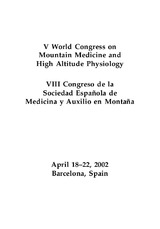| dc.description.abstract | We have previously shown that the maximal anaerobic power of highlander-bolivian children is more affected by their nutrition status rather than by altitude.
To further link these observations to molecular measurements, lactate dehydrogenase (LDH) was studied in
an animal model (Sprague Dawley rat strain) adapted to
chronic hypoxia in La Paz (Bolivia, 3700 m, PB 5 490
mmHg). This strain food intakes are naturally 30 % reduced compared to “normoxic” animals.
Then, two controls groups of low altitude-living rats
were performed: one free fed (ad libitum) and another
(pair-fed) nourished with the food intakes measured for
the hypoxic group. The body weight growth curves were
similar for both hypoxic and pair-fed groups. These observation remain unexplained although IGF-1 receptor
mRNA levels exhibits variations. In white muscle, and
right and left hearts, LDH specific activities drop dramatically in the pair-fed group compared to ad libitum
one. This decreased which is partially compensated in
chronic hypoxia conditions and this modifications cannot
be explained by changes in the LDH isoenzyme patterns.
This data support that anaerobic metabolism variations
observed in altitude result in a confrontation of two mechanisms: hypoxia and reduced food intake. | es_ES |

